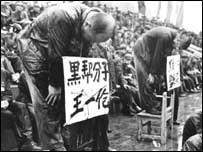Legal traditions in China
Until modern times, law enforcement in China was largely in the hands of extended families, whose reputations and standing in the community depended upon proper behavior of all their members.In 7th Century T'ang China, Dee Jen-djieh was a magistrate who investigated crimes and condemned criminals when families were unable or unwilling to deal with deviants. (During the Ming Dynasty, a thousand years later, a Chinese author wrote about a book about Judge Dee's cases. In the 1940s and '50s, Robert van Gulik, a Dutch diplomat, translated those and wrote a series of sequels.)
Even after the 1949 revolution, law enforcement was as much a populist activity as a Party or government one. The development of legal codes was not a top priority for the revolutionary leadership determined to rebuild a country, create a new economy, and remake human nature.

During the early years of the Cultural Revolution, people were called upon to enforce correct revolutionary behavior on anyone they suspected of being a "capitalist roader" or a less-than-enthusiastic devotee of the teachings of Chairman Mao. Self-criticism sessions (a regular feature of the xiaozu study sessions) required people to publicly admit their shortcomings and accept admonishments, directions for improvement, and punishments. This process served to "purify the Party" and "capture traitors." It also led to some of the lynch mob excesses of the Cultural Revolution.

Now, comes the Internet lynch mob as described by Howard French in the June 3 New York Times. The article will probably be available at French's Web site even after it goes into the Times archive.
It seems that this article along with some other brief readings -- perhaps focusing on the development of property and contract law as well as criminal law -- on the Chinese legal system could become the center of a good comparison with legal codes in the UK and Russia.
Here are excerpts:
Online Throngs Impose a Stern Morality in China
"It began with an impassioned, 5,000-word letter on one of the country's most popular Internet bulletin boards from a husband denouncing a college student he suspected of having an affair with his wife. Immediately, hundreds joined in the attack.
"'Let's use our keyboard and mouse in our hands as weapons,' one person wrote, 'to chop off the heads of these adulterers, to pay for the sacrifice of the husband.'
"Within days, the hundreds had grown to thousands, and then tens of thousands, with total strangers forming teams that hunted down the student, hounded him out of his university and caused his family to barricade themselves inside their home.
"It was just the latest example of a growing phenomenon the Chinese call Internet hunting, in which morality lessons are administered by online throngs and where anonymous Web users come together to investigate others and mete out punishment for offenses real and imagined...
"While Internet wars can crop up anywhere, these cases have set off alarms in China, where this sort of crowd behavior has led to violence in the past. Many draw disturbing parallels to the Cultural Revolution, whose 40th anniversary is this year, when mobs of students taunted and beat their professors. Mass denunciations and show trials became the order of the day for a decade..."



0 Comments:
Post a Comment
<< Home